What do we mean by “redeeming” films? They’re all stories of redemption—sometimes blatantly, sometimes less so. Several of them literally have a character that represents a redeemer; one even includes the Redeemer. With others, you might have to look a bit harder for the redemptive thread, but it’s certainly there. Some are “feel-good” movies that leave a smile on your face; some might leave you uncomfortable, even disturbed, and asking, “How should I process that?” But you won’t be able to shake it from your memory, either.
It’s interesting to note that our top four choices in the list below are all based on true stories, while the rest of the list is based on fiction. That’s not by design, but we find that intriguing. Was there something subconscious going on in our voting? Do we tend to gravitate toward the true stories of redemption over the fictional ones? Perhaps. Or were these four movies simply better than the others in the list? Again perhaps.
Whatever the case, check it out for yourself. We present the list in reverse order, with the No. 1 movie at the bottom. (Just imagine the drum roll in your head and play along, OK?)
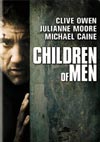  |
10. Children of Men
December featured the released of at least two movies about pregnant young women whose babies represented the future hope of the world—The Nativity Story, which depicts the biblical account of Joseph and Mary and the birth of Christ, and Children of Men, which depicts a future world plagued by global infertility, in which no babies have been born for 18 years. But along comes a miracle: A pregnant girl who, like Mary, must make a harrowing journey in which to give birth to a child who could save mankind—and there’s even a very brave “Joseph” to lead her along the way. (Our review.)
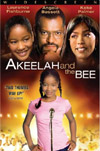  |
9. Akeelah and the Bee
So, only 10 minutes into the movie, you know how it’s probably going to end. But this heartwarming story is rendered so believably well, and the main characters—especially as played by Keke Palmer and Laurence Fishburne—are so endearing, that you don’t care about its predictable outcome. It all adds up to a sweet, family-friendly flick that underscores such themes as persistence in the face of obstacles, families and communities rallying together, and the virtues of fair play and honesty—not to mention the way-cool message that it really can be hip to be a fabulous speller. (Our review.)
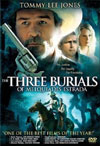  |
8. The Three Burials of Mequiades Estrada
In his directorial debut, Tommy Lee Jones—who also wrote the screenplay—plays a Texas cowboy whose good friend Melquiades, an illegal Mexican alien who has been working for Jones on the ranch, is killed by a racist, trigger-happy border patrolman. Jones’ character spends the rest of the film seeking a sort of revenge, but in a redeeming-but-harrowing way, employing tactics that are quite difficult to watch. He’s not out so much for vengeance as he is to honor his dead friend—and to make the murderer understand the gravity of his sin. Does it work? See for yourself. (Our review.)
  |
7. Tsotsi
In yet another 2006 film focused on the welfare of a baby (like Children of Men and The Nativity Story), this one takes quite a different twist. Here, the infant’s primary “caregiver” is a violent street thug—the title character—from the slums of Johannesburg who, after stealing a car, literally ends up with a baby in his lap. What will he do with it? Will he have the same disregard for this child as he does for other human life? Or might the baby actually get to him, perhaps changing the way he thinks about the value of life? You can probably guess which happens, but the end result is a powerful depiction of redemption.
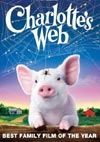   |
6. Charlotte’s Web
Spiders are supposed to make people scream, not cry. But here’s one arachnid that is certain to get your tear ducts moving. Based on arguably the best-written children’s story of all time, there’s no way the film could be as good as E. B. White’s nearly-perfect book. But director Gary Winick and the cast—including Dakota Fanning as Fern and Julia Roberts as the voice of Charlotte—do a terrific job of bringing this beloved tale of redemption to the big screen. Family, community, friendships, self-sacrifice, humility, God’s creation—those are just a handful of the themes handled beautifully here. (Our review.)
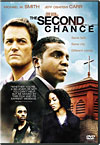  |
5. The Second Chance
Who’d have thought a couple of CCM veterans—Steve Taylor and Michael W. Smith—would make one of the year’s most redeeming films? Taylor directs and Smith stars—with newcomer jeff obafemi carr—in this unassuming but effective depiction of the intersection between a “rich white suburban church” and a “poor black urban congregation.” But it’s much more than that. Smith plays the clueless white worship pastor who learns a thing or two about racial reconciliation—and life in general—from Jake (Carr), the African-American pastor of the inner city church. And Jake learns a few things too. The film had the potential to be trite, but it isn’t. (Our review.)
  |
4. Joyeux Noel
It’s a story that’s almost too unbelievable to be true—and the fact that it is true is likely due to divine intervention. In German-occupied France, on Christmas Eve 1914, soldiers who had been trying to blow one another’s heads off called for an impromptu cease-fire, crawled out of their trenches, and began fraternizing, even fellowshipping, with one another—singing carols, playing soccer, exchanging pleasantries and cigarettes and chocolates. The miracle truce continued for about a day, and then they went back to their regular warring. But for 24 hours, it was truly a blinding light of redemption in the midst of a dark and hellish time. (Our review.)
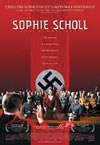  |
3. Sophie Scholl: The Final Days
Would you have the nerve to stand up to Adolf Hitler and the Third Reich, telling them that their methods and philosophies were sinful? A 21-year-old German woman had that kind of courage, a valor driven by her faith in Christ to do the right thing and say the right thing—even if it meant risking her life. Sophie Scholl, who distributed flyers decrying the Hitler regime and defending the Jews, stood up rigorous interrogation by a Nazi officer for hours on end. Their exchanges are riveting, and Sophie’s bravery—as depicted by Julia Jensch—is a shining example of what it means to stand up for truth, no matter the consequences. (Our review.)
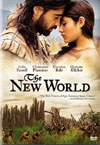  |
2. The New World
Depending on how you feel about Malick’s filmmaking style, the viewer is likely to either love or hate The New World. Eschewing any sort of traditional narrative approach, Malick nevertheless delivers a film that is stunning in its visual beauty and cinematography. At its core, it’s the story of Pocahontas, John Smith and John Rolfe, but even deeper, it’s about how we respond to the still, small voice of the Spirit that whispers in our hearts. For Pocahontas, it’s initially the “spirits” of the Native American world, but later, through the love of Rolfe, she comes to know the true Spirit of Christianity. (Our review.)
   |
1. The Nativity Story
It’s fitting that the story of how the Redeemer came into the world would top our list of the year’s most redeeming films. Interestingly, though, while this film obviously points to God’s redemption through the birth of his Son, his actual redeeming sacrifice is still a future event; in that respect, The Passion of The Christ is more the story of Christ’s redemption than this. But in The Nativity Story, we especially see Joseph’s part in this greatest story fleshed out in ways like never before. Through the imagination of writer Mike Rich, the direction of Hardwicke, and the evocative acting of Oscar Isaac, Joseph really comes alive here, and we get a glimpse of what Scripture means when it simply calls him “a righteous man.” Righteous, and redemptive, indeed. It’s a Christmas story that will ultimately sit on the DVD shelves next to all the usual holiday classics. (Our review.)
Editor’s note: Three of the films in the above list—Joyeux Noel, Sophie Scholl, and The New World—were technically 2005 films; Joyeux and Sophie were actually 2005 Oscar nominees for Best Foreign Film. But very few people—including our critics—actually saw these films until early 2006, so we decided to make them eligible for our 2006 voting. Additionally, the late 2005 version of The New World, which screened only in New York and L.A., was 150 minutes long, but the early 2006 version which released to more U.S. theaters (and on DVD) was edited to a 135-minute version, a very different movie.
We asked each of our voters to describe one movie they wish had made our list of 10 most redeeming films.
Aquamarine
In Aquamarine, a mermaid comes to land with three days to prove true love exists. She, her new human pals and the audience all assume that means finding the clichéd Hollywood version of instant romantic love. Instead, Aquamarine packs a twisty ending that instead lifts up the biblical ideal of love and shows it in an everyday, living sacrifice way. In fact, this family film is a wonderful parable for 1 Corinthians 13: Aquamarine’s love cares more for others than self, loves at all times, puts up with anything, isn’t always “me first,” and never dies. (Our review.)—Todd Hertz
Babel
Babel was conceived as a film about the desperate condition of mankind, but it became a film of unexpected hope and optimism. Not that the desperation is gone—indeed, it’s hard to imagine a film that more vividly and painfully portrays the inability of human beings to truly communicate with one another, the pride and egotism that keep us apart, and the high price we pay for our fractured relationships. The film’s title, of course, is taken from the Bible, and it does indeed speak with a prophetic voice—first with a shout, then with a whisper—about mankind’s muddled communication, and the hope that we find in genuine acts of Christian love and compassion. (Our review.)—Josh Hurst
The Death of Mr. Lazarescu
The Death of Mr. Lazarescu is the harrowing story of one man’s dying, as unadorned and realistically rendered as a home movie. This fading old drunk can do little to earn our affection as he’s shunted from one overtaxed, understaffed Romanian hospital to the next, yet his pain, his weakness, his fleeting moments of dignity stir us to compassion. Writer-director Cristi Puiu believes, in the face of all this, that “there is a God who created a perfect world” where “everything is related to everything.” This sad, raw film is his memento mori, a remembrance of death that has the power to quicken our humanity.—Ron Reed
The Fountain
Like 2001: A Space Odyssey, Darren Aronofsky’s romantic sci-fi drama isn’t as hard to follow as it is to grasp. And while there’s some Buddhist imagery and themes, some are also undeniably Christian in this cinematic parable centering on the Tree of Life. That’s the beauty of it—like a painting in a museum, it exists for you to interpret on your own. For me, it’s a haunting meditation on fear and love, reminding us to be grateful for the time we have—to live with hope even when the shadow of death looms. (Our review.)—Russ Breimeier
Half Nelson
The juxtaposition of strength and weakness is a central theme in Half Nelson. It features the quiet, but compelling performance of Ryan Gosling as an inner city school teacher hooked on crack, and Shareeka Epps, a student who catches him just after shooting up. The two form a halting friendship that demonstrates how the watchful presence of another human can shine a sort of light into our dark corners. Half Nelson offers viewers a chance to honestly grapple with their own hypocrisies and inconsistencies—large and small—and suggests that wholeness is possible.—Lisa Ann Cockrel
A Prairie Home Companion
Garrison Keillor’s A Prairie Home Companion has entertained radio listeners since 1974, showcasing American music, history, and community with a non-stop parade of talented guest performers. Visionary director Robert Altman’s final film brings Keillor to the screen at last, capturing the home-cooked goodness of his storytelling. Meryl Streep, Lily Tomlin, John C. Reilly, Kevin Kline, and others improvise memorable comedy, reminding us that the best things in life are often found off the beaten path, where old-fashioned, hand-crafted good times flourish. Companion reminds us that the highway of ego, glamour, and greed runs perpendicular to the meandering backroad of joy. (Our review.)—Jeffrey Overstreet
The Pursuit of Happyness
The Pursuit of Happyness celebrates the commitment and sacrifice of Hollywood’s most responsible struggling father since Cinderella Man. Will Smith stars with real-life son Jaden Smith in the fact-based story of unsuccessful salesman Chris Gardner, whose marriage breaks apart and who goes broke pursuing a longshot chance at a better life. Chris’s efforts to protect and care for his son under increasingly dire circumstances are both heart breaking and deeply moving, and young Jaden’s matter-of-fact performance suggests both the resilience and vulnerability of childhood. Hard work and hope collide with hard reality and hard luck as The Pursuit of Happyness earns its title, and its happy ending. (Our review.)—Steven D. Greydanus
Superman Returns
Director Bryan Singer had done a great job with the first two X-Men movies, so when he jumped that ship to this one, I thought we’d get a terrific movie about the man of steel. Well, it’s not terrfice, but it is very good—and clearly, as Singer even said he intended, depicts Supes as something of a Christ figure. Sure, he’s shown saving the world, but perhaps the most compelling scene is when he hangs in the atmosphere, arms outstretched almost in a crucifix position, head bowed, eyes closed, and he’s tuning in to the world’s desperate cries for help—hearing our prayers, so to speak. No, he can’t save our souls, but he sure can stop a runaway jet and a speeding bullet. (Our review.)—Mark Moring
Ushpizin
A devoutly Hasidic Jewish couple struggles with infertility and the “tests” that God sends their way during the harvest festival of Sukkot—including a couple of AWOL prisoners who drop by, one of whom knows the husband from his pre-conversion days. With a real-life couple playing the fictitious couple, and a real-life convert playing the fictitious convert, Giddi Dar’s film is a delightful and suspenseful celebration of faith, marriage, and hospitality.—Peter T. Chattaway
We Are Marshall
When a plane crash kills almost the entire Marshall University football team and staff in 1970, the town of Huntington, West Virginia is devastated. As they bury their sons, husbands, fathers, and football heroes, some of their spirit dies as well. But then the three remaining players and new coach Jack Lengyl begin the controversial work of rebuilding. Is it too soon to move forward? Or is this a needed step in the grieving process? Either way, we see hope rise—in realistic fits and starts. With it comes the realization that sometimes winning comes in simply showing up. (Our review.)—Camerin Courtney
Copyright © 2006 Christianity Today. Click for reprint information.








